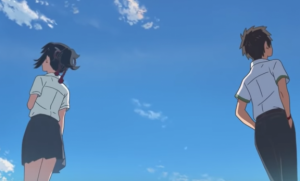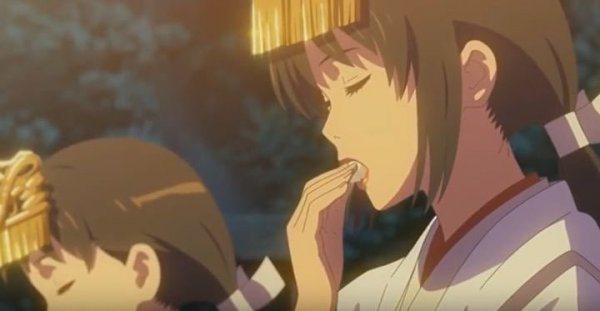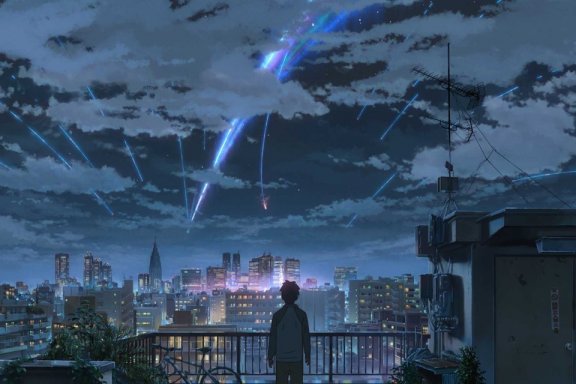Your Name: The Japanese Film of Traditions, Trends, and Myths


Written and verified by the film critic Leah Padalino
The animated Japanese movie Your Name can provoke an adverse reaction in some people. But this movie can also lead to an awakening. The beauty of its images and the universality of the story make it an exciting movie that appeals to feelings.
This is an animated film that premiered in 2016. Makoto Shinkai, the comic which inspired the film, directed it.
Your Name, up to this point, is the highest-grossing animated Japanese movie at the box office. Other than all of the accolades, what attributes to its great success?
The fact is that Your Name is a film that can fascinate any type of audience. This includes those who reacted negatively to the preview of the film.
The message that the movie delivers is universal and appeals to the sentiments and to love. In addition, it’s an example of Japanese traditions.
In fact, if we look at it from the Western perspective, we won’t be able to understand the entire meaning. Going beyond the love story or connection between two young people, Your Name shows us what makes up Japanese mythology. Because of this, the film is more significant to the Japanese audience.
The Movie’s Message
However, even though we don’t comprehend the entire magnitude of the message at the heart of the movie, there’s a universal story that we’ll take in and will mesmerize us. It’s important not to be skeptical before seeing Your Name. Often, many people allow appearances and audiovisual content to make them reject a movie without giving it a chance.
The protagonists of Your Name are two adolescents. However, the film isn’t trying to paint a picture of a happy stage of life or delve deep into the problems of this age group. At the same time, it’s not an animated movie exclusively for children. It has a good script and, of course, exceptional images. The animation seems like photography and connects with the story.
Your Name: Tradition and the Modern World
The film begins introducing us to Mitsuha, an adolescent female who lives in a little town called Itomori. Tired of how boring small-town life is, she decides to move to Tokyo.
Her wishes, as harebrained as they seem, can sometimes become reality. Mitsuha begins to have strange dreams in which she leaves her body and rural life. In these dreams, she turns into a young person who lives in Tokyo.
Soon, we discover that Taki is a real person and that those dreams are very vivid. Sometimes, the two of them switch bodies. In other words, Taki wakes up occasionally in the body of Mitsuha and vice versa.
These interchanges continue to occur with more frequency and the teens begin to leave messages on their mobile phones with their daily activities. Even now, there’s still a place for fantasy.
The fact that there seems to be more technology reinforces that vision. Fantasy and reality tend to combine on the screen. These interchanges make a connection with a dream world and with nighttime. In the world of dreams, anything is possible. During the night, magical things happen.

The Old and the New
In many traditions, people associate dawn with magical and supernatural events. This ray of light that separates day from night is a line between different words. Furthermore, it’s like a moment that combines reality with fiction or life with death. In fact, in the movie, we see that the idea of dawn is frequently mentioned.
In Itomori, ancestral traditions continue to appeal to people. We see Mitsuha preparing sake in the old way. Which means, chewing the grains of rice, then spitting them out to allow them to age. In the Japanese tradition, young virgin women prepared sake, which possessed magical attributes. In the film, we see how it’s associated with the gods.
During the two main scenes of the movie, Tokyo and Itomori are explained. Tokyo is one of the most modern and technological cities of the world, but it’s in a country that’s plagued with the origin of death myth.
Often, we forget this culture and that Japan isn’t the only city of Tokyo. However, this country is much more than just a great city. Even Mitsuha has a totally idealized image of the great city and rejects its origins.
Your Name combines tradition and modernity and does this through the protagonists and the story that it tells. Beyond the exchange of bodies, the plot takes a new direction at the time when both protagonists want to find each other. At this point, it goes in a new direction and takes us on an impossible search.

The Legend of the Red Thread
In the field of fantastic literature, the impossible can be expressed. Nevertheless, Your Name has some aspects that make it difficult to support its feasibility and can cause some confusion for the viewer. Jumping from one scene to the other may seem odd. Of course, if we look for empty arguments, we’ll find more than one.
The movie fills those holes with the support of Japanese myth, which possesses the elements of magic and fantastic events. Your Name is worth watching. For instance, the quality of its animation is superb, the scenes are very detailed, and, at times, are even close to the accuracy of photographs. It’s neither rational nor logical, but it appeals to the emotions and includes magic and love.
Eastern Culture
In Eastern tradition, there’s an ancestral legend that connects people by means of a red thread. This is a thread that’s unseen but unbreakable. It can become tangled or stretched but never torn, and it connects people from birth until eternity. No matter what happens, the people who are connected at the ends of the thread are destined to find one another.
The movie speaks directly about this legend, which appears at the beginning. One of the oldest traditions is the woven thread. Similarly, Mitsuha always wears a red rope and he throws it to Taki at a specific time. It also produces an awareness of another known place and time.
In the West, it’s the mystery of mental attraction. Although we may not know the Asian legend, the red thread in the film is visual and makes us think about a connection between the protagonists. Again, it’s a connection that can overcome barriers of space and time that can create a new destiny, even though it seemed impossible that they would be able to find each other.

Your Name: The Universality of Love
A story of such magnitude told through the eyes of two adolescents could be easily considered corny. However, you should bypass these negatives to perceive a universal story that demonstrates that there’s a place for love and feelings.
The beauty of these images goes along with the idea to create a poetic atmosphere. It helps us forget the initial confusion and experience emotions. The magic of the stars, nature, the universe, and contact with the spirituality in the film can temporarily make us forget our usual skepticism.
All of this adds up to the interesting initial point of view: the idea of seeing through the eyes of another person and putting oneself in another person’s shoes. Mitsuha wants to escape from Itomori, but Taki will stay, due to how much he loves the place’s beauty. At the same time, Taki becomes aware of the possibilities in a city like Tokyo. Mitsuha will find opportunity everywhere. Thus, the world changes according to each person’s perspective.
Your Name is also funny. This way, it brings a certain realism to the movie. Despite its mythological holes, the dreams, and the emotions, the movie delivers a universal message.
The animated Japanese movie Your Name can provoke an adverse reaction in some people. But this movie can also lead to an awakening. The beauty of its images and the universality of the story make it an exciting movie that appeals to feelings.
This is an animated film that premiered in 2016. Makoto Shinkai, the comic which inspired the film, directed it.
Your Name, up to this point, is the highest-grossing animated Japanese movie at the box office. Other than all of the accolades, what attributes to its great success?
The fact is that Your Name is a film that can fascinate any type of audience. This includes those who reacted negatively to the preview of the film.
The message that the movie delivers is universal and appeals to the sentiments and to love. In addition, it’s an example of Japanese traditions.
In fact, if we look at it from the Western perspective, we won’t be able to understand the entire meaning. Going beyond the love story or connection between two young people, Your Name shows us what makes up Japanese mythology. Because of this, the film is more significant to the Japanese audience.
The Movie’s Message
However, even though we don’t comprehend the entire magnitude of the message at the heart of the movie, there’s a universal story that we’ll take in and will mesmerize us. It’s important not to be skeptical before seeing Your Name. Often, many people allow appearances and audiovisual content to make them reject a movie without giving it a chance.
The protagonists of Your Name are two adolescents. However, the film isn’t trying to paint a picture of a happy stage of life or delve deep into the problems of this age group. At the same time, it’s not an animated movie exclusively for children. It has a good script and, of course, exceptional images. The animation seems like photography and connects with the story.
Your Name: Tradition and the Modern World
The film begins introducing us to Mitsuha, an adolescent female who lives in a little town called Itomori. Tired of how boring small-town life is, she decides to move to Tokyo.
Her wishes, as harebrained as they seem, can sometimes become reality. Mitsuha begins to have strange dreams in which she leaves her body and rural life. In these dreams, she turns into a young person who lives in Tokyo.
Soon, we discover that Taki is a real person and that those dreams are very vivid. Sometimes, the two of them switch bodies. In other words, Taki wakes up occasionally in the body of Mitsuha and vice versa.
These interchanges continue to occur with more frequency and the teens begin to leave messages on their mobile phones with their daily activities. Even now, there’s still a place for fantasy.
The fact that there seems to be more technology reinforces that vision. Fantasy and reality tend to combine on the screen. These interchanges make a connection with a dream world and with nighttime. In the world of dreams, anything is possible. During the night, magical things happen.

The Old and the New
In many traditions, people associate dawn with magical and supernatural events. This ray of light that separates day from night is a line between different words. Furthermore, it’s like a moment that combines reality with fiction or life with death. In fact, in the movie, we see that the idea of dawn is frequently mentioned.
In Itomori, ancestral traditions continue to appeal to people. We see Mitsuha preparing sake in the old way. Which means, chewing the grains of rice, then spitting them out to allow them to age. In the Japanese tradition, young virgin women prepared sake, which possessed magical attributes. In the film, we see how it’s associated with the gods.
During the two main scenes of the movie, Tokyo and Itomori are explained. Tokyo is one of the most modern and technological cities of the world, but it’s in a country that’s plagued with the origin of death myth.
Often, we forget this culture and that Japan isn’t the only city of Tokyo. However, this country is much more than just a great city. Even Mitsuha has a totally idealized image of the great city and rejects its origins.
Your Name combines tradition and modernity and does this through the protagonists and the story that it tells. Beyond the exchange of bodies, the plot takes a new direction at the time when both protagonists want to find each other. At this point, it goes in a new direction and takes us on an impossible search.

The Legend of the Red Thread
In the field of fantastic literature, the impossible can be expressed. Nevertheless, Your Name has some aspects that make it difficult to support its feasibility and can cause some confusion for the viewer. Jumping from one scene to the other may seem odd. Of course, if we look for empty arguments, we’ll find more than one.
The movie fills those holes with the support of Japanese myth, which possesses the elements of magic and fantastic events. Your Name is worth watching. For instance, the quality of its animation is superb, the scenes are very detailed, and, at times, are even close to the accuracy of photographs. It’s neither rational nor logical, but it appeals to the emotions and includes magic and love.
Eastern Culture
In Eastern tradition, there’s an ancestral legend that connects people by means of a red thread. This is a thread that’s unseen but unbreakable. It can become tangled or stretched but never torn, and it connects people from birth until eternity. No matter what happens, the people who are connected at the ends of the thread are destined to find one another.
The movie speaks directly about this legend, which appears at the beginning. One of the oldest traditions is the woven thread. Similarly, Mitsuha always wears a red rope and he throws it to Taki at a specific time. It also produces an awareness of another known place and time.
In the West, it’s the mystery of mental attraction. Although we may not know the Asian legend, the red thread in the film is visual and makes us think about a connection between the protagonists. Again, it’s a connection that can overcome barriers of space and time that can create a new destiny, even though it seemed impossible that they would be able to find each other.

Your Name: The Universality of Love
A story of such magnitude told through the eyes of two adolescents could be easily considered corny. However, you should bypass these negatives to perceive a universal story that demonstrates that there’s a place for love and feelings.
The beauty of these images goes along with the idea to create a poetic atmosphere. It helps us forget the initial confusion and experience emotions. The magic of the stars, nature, the universe, and contact with the spirituality in the film can temporarily make us forget our usual skepticism.
All of this adds up to the interesting initial point of view: the idea of seeing through the eyes of another person and putting oneself in another person’s shoes. Mitsuha wants to escape from Itomori, but Taki will stay, due to how much he loves the place’s beauty. At the same time, Taki becomes aware of the possibilities in a city like Tokyo. Mitsuha will find opportunity everywhere. Thus, the world changes according to each person’s perspective.
Your Name is also funny. This way, it brings a certain realism to the movie. Despite its mythological holes, the dreams, and the emotions, the movie delivers a universal message.
This text is provided for informational purposes only and does not replace consultation with a professional. If in doubt, consult your specialist.







